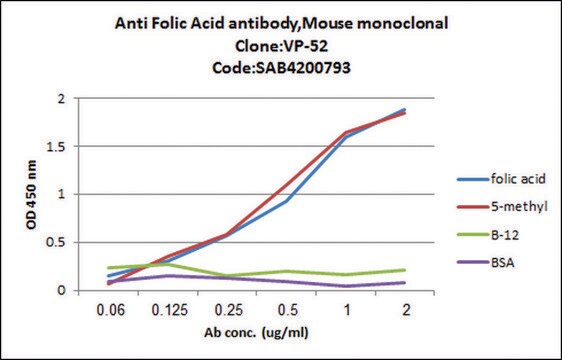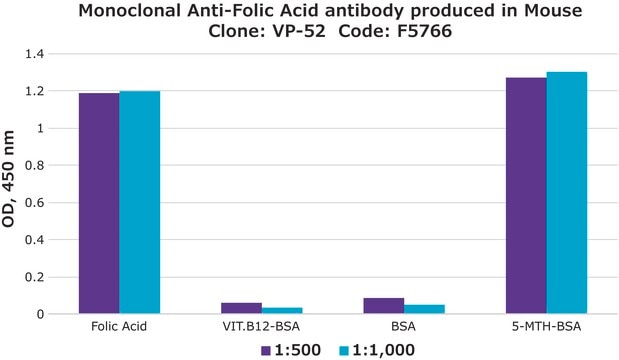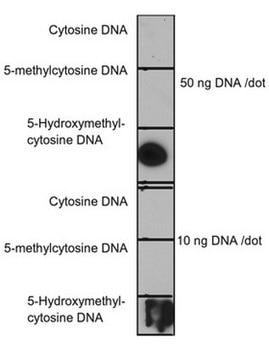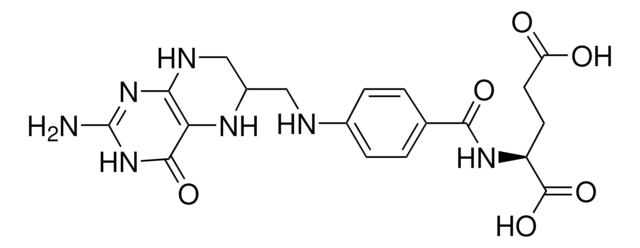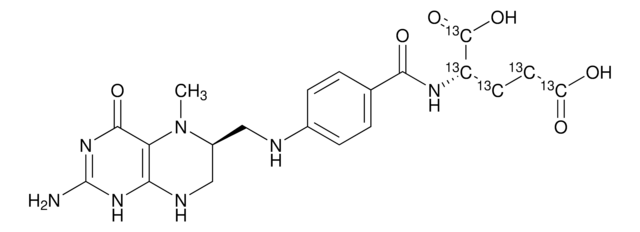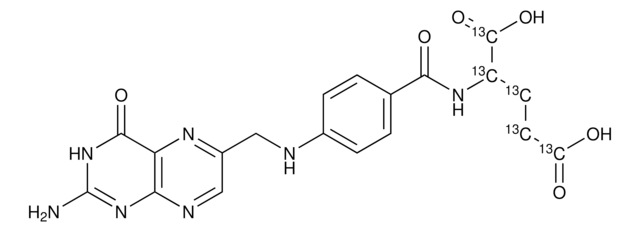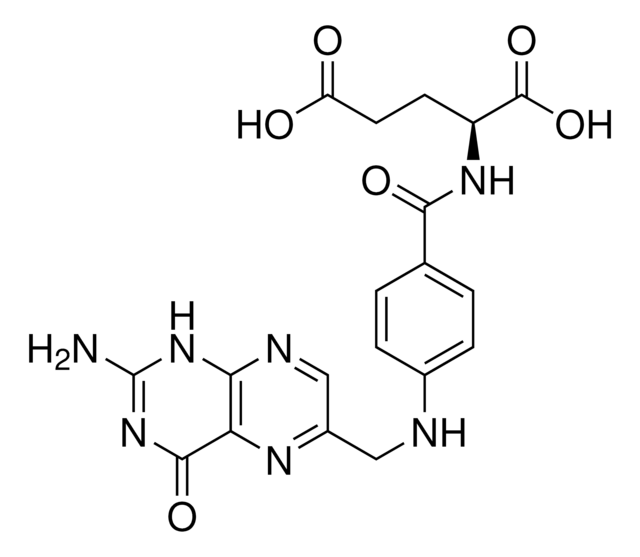M5028
Monoclonal Anti-5MTH Folic Acid antibody produced in mouse
clone FA-24, ascites fluid
Sign Into View Organizational & Contract Pricing
All Photos(1)
About This Item
Recommended Products
biological source
mouse
Quality Level
conjugate
unconjugated
antibody form
ascites fluid
antibody product type
primary antibodies
clone
FA-24, monoclonal
contains
15 mM sodium azide
technique(s)
indirect ELISA: 1:5,000
isotype
IgG2b
shipped in
dry ice
storage temp.
−20°C
target post-translational modification
unmodified
Related Categories
General description
Monoclonal Anti-5MTH Folic Acid antibody is specific for an epitope present on 5MTHFA and does not detect folic acid. This hybridoma is a cloned cell line derived from a fusion between a mouse myeloma cell line and splenocytes from BALB/c mice immunized with 5MTH Folic acid conjugated to KLH.
Immunogen
5MTH folic acid, conjugated to KLH.
Application
Monoclonal Anti-5MTH Folic Acid antibody is suitable for use in indirect (Enzyme Linked Immuno Sorbent Assay) ELISA (1:5,000) and competitive ELISA.
Monoclonal Anti-5MTH Folic Acid antibody is suitable for use in indirect ELISA (1:5,000).
Biochem/physiol Actions
5-Methyltetrahydrofolate (5-MTHF) is a cofactor that regulates the conversion of homocysteine to methionine in the presence of another co-factor, vitamin B12. 5-MTHF is also involved in modulating antioxidative and cognitive functions. Increased serum 5-MTHF levels have been linked to anemia and macrocytosis. The antibody reacts with 5MTHFA as a free reagent or when conjugated to carriers such as KLH or BSA. Furthermore, the product associates with 5MTHFA bound to the endogenous folate binder in human plasma and serum. The monoclonal antibody does not cross-react with tetrahydrofolic acid, folinic acid, dihydrofolic acid, and vitamin B12.
Vitamin B12 and folic acid are metabolically interrelated. The enzyme methionine synthetase, which catalyzes the conversion of homocysteine to methionine, requires vitamin B12 and 5MTHFA as cofactors. In the absence of vitamin B12, 5MTHFA cannot be converted to tetra hydro folic acid and enter the metabolic pool of 1-carbon fragment acceptors. Vitamin B12 and folate deficiencies are the most common causes of megaloblastic anemia, abnormal hemopoiesis, interference in the maintenance of normal nerve tissue and general intracellular uptake and function disorders in humans. Folic acid deficiency is common in pregnant women, alcoholics, those whose diets do not include raw fruits and vegetables and people with structural or functional damage to the small intestine.
Disclaimer
Unless otherwise stated in our catalog or other company documentation accompanying the product(s), our products are intended for research use only and are not to be used for any other purpose, which includes but is not limited to, unauthorized commercial uses, in vitro diagnostic uses, ex vivo or in vivo therapeutic uses or any type of consumption or application to humans or animals.
Not finding the right product?
Try our Product Selector Tool.
wgk_germany
nwg
flash_point_f
Not applicable
flash_point_c
Not applicable
Certificates of Analysis (COA)
Search for Certificates of Analysis (COA) by entering the products Lot/Batch Number. Lot and Batch Numbers can be found on a product’s label following the words ‘Lot’ or ‘Batch’.
Already Own This Product?
Find documentation for the products that you have recently purchased in the Document Library.
Bashir M Rezk et al.
FEBS letters, 555(3), 601-605 (2003-12-17)
The presumed protective effect of folic acid on the pathogenesis of cardiovascular, hematological and neurological diseases and cancer has been associated with the antioxidant activity of folic acid. Peroxynitrite (PON) scavenging activity and inhibition of lipid peroxidation (LPO) of the
Martha Savaria Morris et al.
The American journal of clinical nutrition, 91(6), 1733-1744 (2010-04-02)
Folate deficiency has serious consequences for the fetus. Folic acid fortification of food addresses this problem. However, clinical consequences of vitamin B-12 deficiency may be worsened by high folic acid intakes, perhaps as a direct result of unmetabolized folic acid
Folic acid deficiency and cancer: mechanisms of DNA instability
Duthie S J.
British Medical Bulletin, 55(3), 578-592 (1999)
Intestinal absorption of folic acid - new physiologic & molecular aspects
Milman, N.
The Indian Journal of Medical Research, 136(5), 725-725 (2012)
Our team of scientists has experience in all areas of research including Life Science, Material Science, Chemical Synthesis, Chromatography, Analytical and many others.
Contact Technical Service